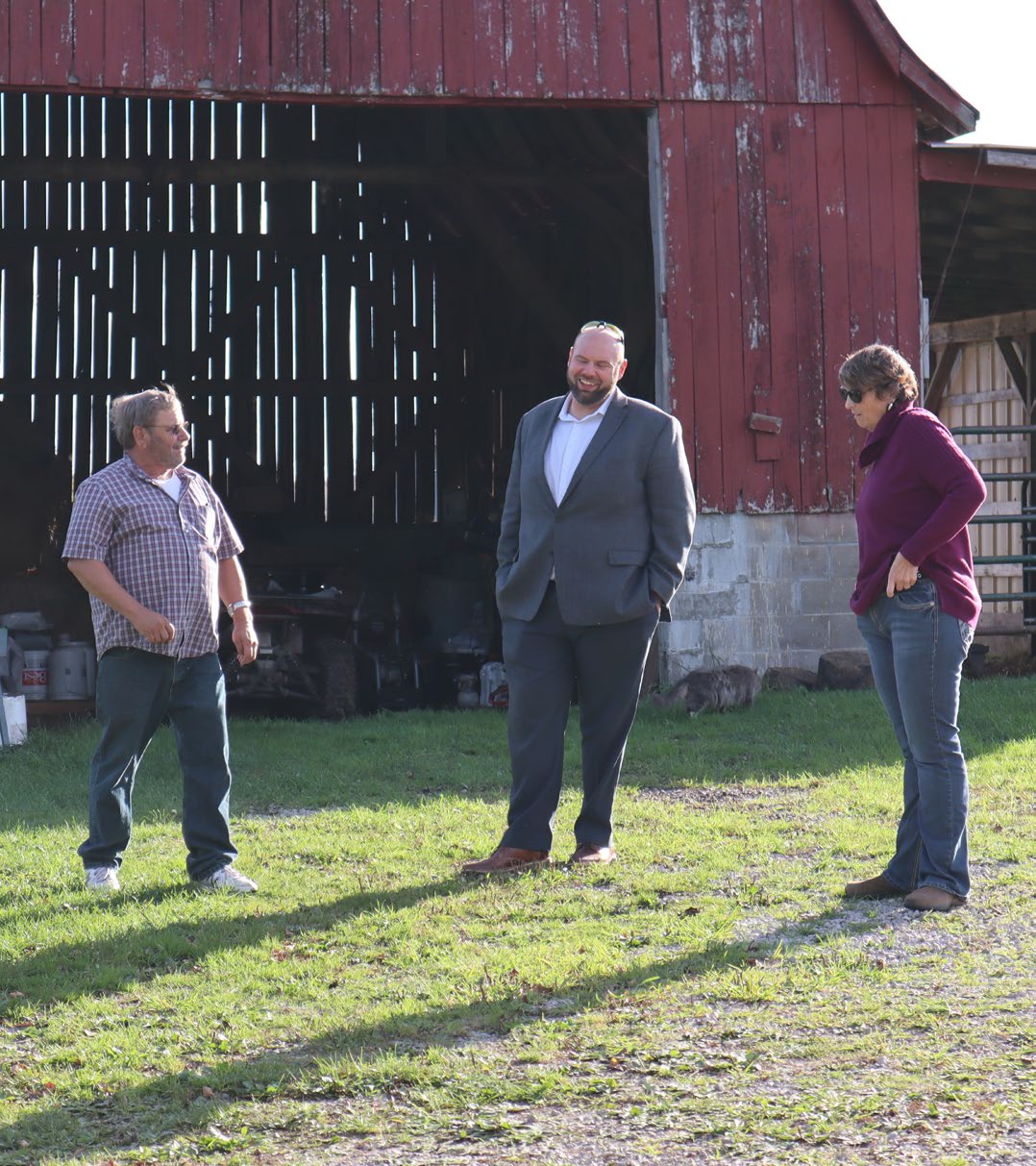
Helping Farmers Connect to Support Resources
DOWNLOADJune 7, 2022 - Becky McKendry, Michigan State University Extension
Impacts
Farming can be an incredibly unpredictable and dangerous occupation, and the stresses that come with the job can greatly affect farmers and their families. MSU Extension is committed to supporting agricultural professionals and their families as they make their way through tough times. By leveraging its position as a trusted organization with a history of working with producers, MSU Extension helps raise awareness of emerging mental health needs in the farming community. Dedicated Extension staff work within their communities to provide a wealth of knowledge and training tools to Michigan’s local farm organization chapters, leaders and stakeholders.
MSU Extension farm stress educational programs vary in length and target audience. Programs are sometimes part of larger events, such as fruit and vegetable expos or statewide conferences, and at other times offered as standalone events. Topics covered include:
- Stressors that are unique to agriculture producers
- Signs and symptoms of stress and suicide
- Communication strategies for working with distressed farmers
- Information on appropriate professional and community resources for distressed producers.
As a result of MSU Extension's farm stress programming and outreach:
- 98% of participants in a 2021 Mending the Stress Fence program reported improved understanding of the warning signs of suicide.
- 773% increase in farmers accessing teletherapy services through MSU Extension's partnership with Pine Rest Christian Mental Health Services in 2021, compared to 2020.
- 879 farmers, farm workers and agribusiness professionals reached through 30 different outreach opportunities in 2021.
- 9,111 views on weekly Facebook "Lunch Break" live events in 2021.
Priority Areas
- Helping farmers meet their health goals.
- Providing tools to improve health.
- Building peer-to-peer networks.
- Supporting farmers through crises.
- Reducing stigma surrounding mental health and promoting helpful resources.
- Reducing stigma-related barriers to help-seeking behaviors.
"Thank you, I didn't believe in the counseling program when you shared it with me, but this program gave me my life back and might have saved it in the process." Farmer engaged with MSU Extension's farm stress team and grant-funded teletherapy program
To support the efforts of the MSU Extension farm stress team, contact Dr. Cheryl Eschbach at cheryl@msu.edu. To request a presentation or to bring resources into your community for farmers experiencing stress or a mental health crisis, contact Dr. Remington Rice at riceremi@msu.edu.
Michigan Farmers Talk About MSU Extension's Farm Stress Teletherapy Program
Through an innovative partnership with Pine Rest, MSU Extension’s farm stress team refers farmers experiencing stress and mental health issues to professional online counseling. Farmers are linked with a licensed mental health therapist who have an understanding of the agricultural community for confidential teletherapy services (counseling sessions conducted by video chat). This flexible approach allows farmers and farm families to access behavioral health supports from a comfortable, familiar environment.
Teletherapy has proven to be an invaluable lifeline for many farmers experiencing stress. For example, after a devastating bovine tuberculosis outbreak in his herd, a Michigan cattle farmer named Jim, and his wife, Kelly, needed support to deal with their grief and stress. They connected with the MSU Extension farm stress team, who helped them engage with the grant-supported teletherapy program.
Jim and Kelly shared how teletherapy helped them through their tough times in a November 2021 video interview (https://bit.ly/3qTJ5CF)

Helping Farmers Learn About Mental Health
Throughout 2021, the MSU Extension farm stress team worked to improve farmers’ understanding of the importance of their well-being, as well as symptoms of stress and signs that someone may be considering suicide. Of 125 participants who completed a survey on their experience with MSU Extension’s Mending the Stress Fence programs, 98% reported they had improved their understanding of the warning signs of suicide and 99% reported an improved understanding of well-being. Additionally, 100% of participants reported an increased awareness of the signs of stress.
Program survey results indicate that farmers who met with members of the MSU Extension farm stress team developed an improved understanding of effective and helpful communication techniques. Ninety-eight percent of participants reported improved confidence in how to ask open-ended questions, which can be particularly important when trying to reach out to someone undergoing a mental health crisis.
In addition to providing programming opportunities, MSU Extension educators also published a variety of online articles in 2021 intended to reach the agricultural community with education and support. Topics covered included everything from the effects of stress on physical health to tips on fighting isolation during the pandemic, as well as a promotional article outlining the expansion of eligibility for MSU Extension’s teletherapy program to include professionals in the aquaculture industry.

National Presentation Reaches Tribal Educators & Native Producers
In 2021, the U.S. Department of Agriculture’s National Institute of Food and Agriculture invited MSU Extension educators to provide farm stress resources to tribal Extension educators and native producers.
In March, MSU Extension educators shared a modified version of the Mending the Stress Fence program to the Native Waters on Arid Lands (NWAL) group. They added relevant and culturally sensitive information on farm stress, mental health and wellness, suicide awareness and community resources.
(NWAL seeks to enhance the climate resiliency of agriculture on American Indian lands of the Great Basin and Southwest by building the capacity within tribal communities to develop and implement reservation wide plans, policies and practices to support sustainable agriculture and water management.)
Participants in the modified Mending the Stress Fence program reported gaining great value from it, and shared the following reflections on their experiences:
- "I learned that it is important to ask people directly if they are thinking of committing suicide, and I appreciated the example of how to word that question and next steps if they answer that they are thinking of suicide. Great presentation, thank you!" - Participant identifying as 39-year-old white female from Nevada.
- "It's a tough thing to talk about, but more education on this topic really helps people to understand." - Participant identifying as Alaskan Native/American Indian male.
- "I lost my fiancé to suicide last September 2020. The warning signs, thinking I can get him through it - I feel the guilt of that. But I know I did everything I could for him. Get this presentation out to ranchers and families, so others can be saved." - Participant identifying as Alaskan Native/American Indian female.
- "Regarding stress and how to deal with it, including things we can't control, such as weather, I believe it's sometimes easier said than done. The presentation was very good, with lots of great information. Farming has changed a great deal, it' snot just planting a crop, harvesting it and selling it." - Participant identifying as 52-year-old white male from Midwest.
In 2021, MSU Extension district director Eric Karbowski and farm stress educator Remington Rice presented the Mending the Stress Fence program at Great Lakes Expo in partnership with the Michigan Agritourism organization. After the session, they received positive feedback from participants:
"Thank you so much, Eric and Remington, for going to the Expo and presenting. You both did a phenomenal job, and it was amazing when people around the room started to share their stories. It's such a difficult topic, but the more that it is visible the more that it will get the attention that it needs." Wendy, Michigan Agritourism board member
"This was the best session I went to during the Expo. It's a difficult but important topic and I'm glad I went. I wish my dad would have [gone] to something like this many years ago." Mike, Michigan Agritourism member



 Print
Print Email
Email



